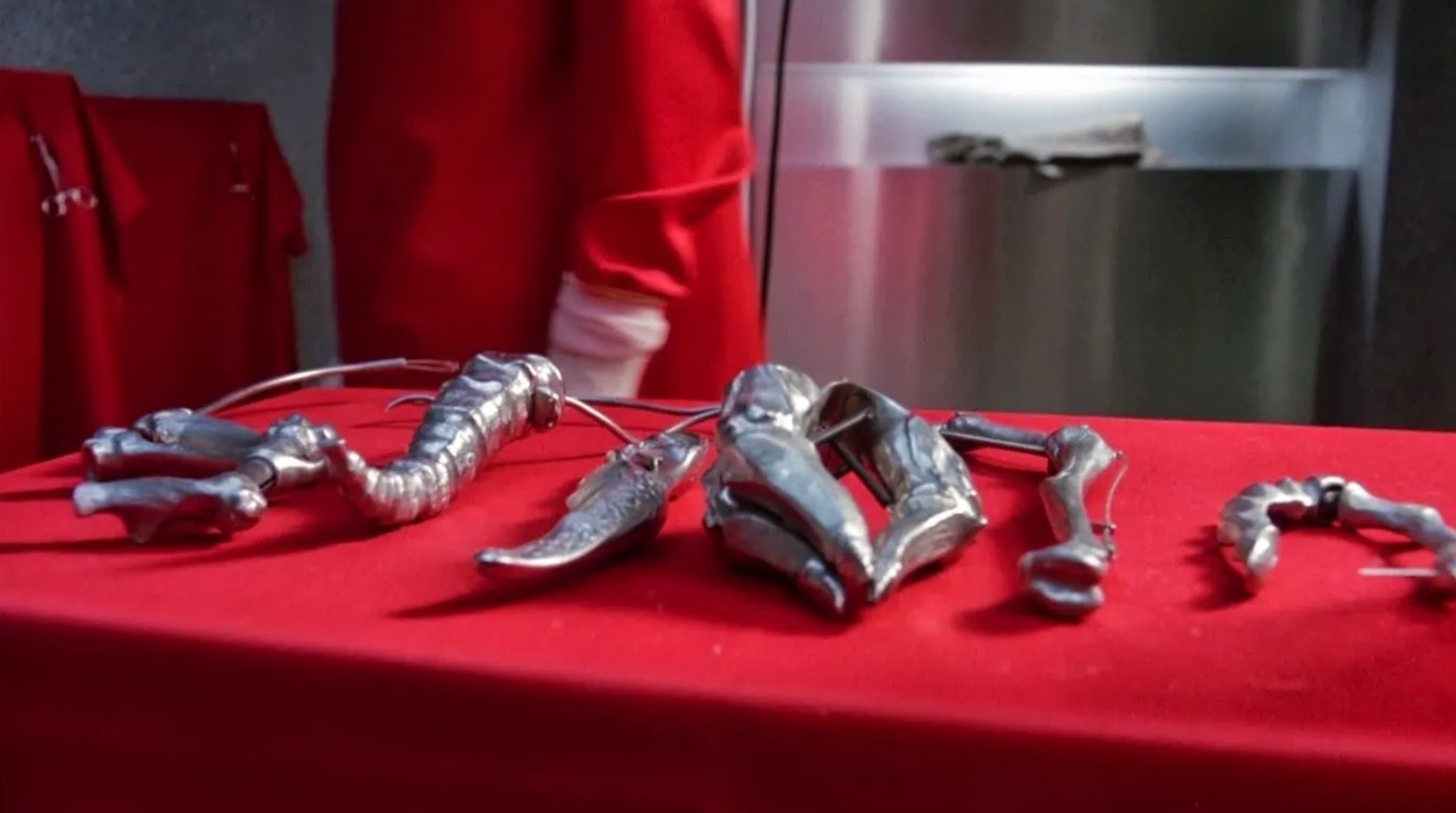
David Cronenberg has so thoroughly defined the body horror genre with his visceral focus on the degradation of humanity that we had to invent the term “Cronenbergian” to describe his five decades of work. Horror may have evolved over the last half-century, but Canada’s most infamous gorehound has lost none of his potency. From the prescient gaze into the scandal-driven demands of modern entertainment with Videodrome, to the clinical examination of sexuality in a technological era of Crash, his films have only grown more potent with age. The one that stands head and shoulders above the rest, however, hits a lot closer to home than tales of mutating TV screens and exploding heads.
Dead Ringers exemplifies many women’s worst nightmares. The thriller follows identical twin gynecologists Elliot and Beverly Mantle (both Jeremy Irons, in an all-time great performance), who run a successful fertility clinic. Famed for their ability to get practically every client pregnant, they also tend to seduce them. Elliot, the more confident, makes the moves on patients, then passes them to the shy Beverly when he gets bored, leaving the women none the wiser. When Claire Niveau (Geneviève Bujold) enters the clinic, the brothers become emotionally attached to her, and their scheme is revealed. While she decides to go steady with Beverly, adding a third wheel to the brothers’ co-dependent relationship leads them down a dark path.
The basic setup of Dead Ringers is self-evidently horrific, and based on a sensitive area of medicine that remains fraught with political restrictions and social shame. Gynecology, once a fringe science, owes many of its developments to 19th-century physician J. Marion Sims, who took women’s reproductive health seriously but performed tremendously painful experiments on enslaved Black women who couldn’t offer meaningful consent. Nearly two centuries later, the Mantles’ technical brilliance shows how far we’ve come... and their complete indifference to their patients’ well-being shows how far we haven’t.
Anyone who’s undergone a cervical exam knows how embarrassing, invasive, and painful it can be. It’s one of the most personal experiences you can have with a total stranger, so imagine going into an already unnerving environment and learning that your doctors are viewing you as prey. Jeremy Irons, one of the great performers of modern deviance, is painfully familiar as two men who see women as little more than toys they’re entitled to because of their profession and gender.
The horror of reproductive abuse and the fear of female bodies being turned against us is a common horror feature. What is the slasher, if not a canvas for a woman to be dissected? Dead Ringers is part of a notorious tradition of gyne-horror, wherein everything south of the border becomes a battleground. Rosemary’s Baby, in which a woman is unwittingly offered up as a sexual sacrifice to Satan by her own husband, is one of its progenitors. Demon Seed reimagined the idea with a super-computer, delving into scientific advancements accused of further dehumanizing the human race. Cronenberg himself had already explored the issue with The Brood, wherein a woman’s rage allows her to asexually birth creatures who act out her murderous desires.

This year, Dead Ringers received an acclaimed Amazon remake that made the Mantles women (both played by Rachel Weisz) and worked the advancement of medical technology into the narrative. Concerns over stripping humanity from the reproductive process entirely were a natural fit, and the remake drove home that coercion and abuse of professional privileges aren’t exclusively the domain of men. Yet Dead Ringers in its original form is timeless for a reason. As much as things have changed in this realm, the idea of women being turned into toys and experiments by those in power has never gone out of style.
Perhaps the most leg-crossing moment of agony comes when Beverly, amid a manic fit of depression and drug abuse, commissions an artist to make a new set of gynecological instruments for operating on what he describes as “mutant women.” If you thought a speculum was bad, imagine one designed by H.R. Giger. Mercifully, he never gets to use them on the unconscious woman he’s operating on, but the mere thought of such a heinous abuse of power will creep out half the planet’s population for a reason. It’s no coincidence that many of today’s most virulent anti-choice legislators love to enforce invasive gynecological requirements — like transvaginal ultrasounds — on those seeking abortions.

You see very little blood in Dead Ringers, which makes it remarkably tame by Cronenberg’s standards, but the ever-forceful power of suggestion is what sends your mind spinning. What were those mutant tools meant for? What did the Mantle brothers do to unconscious women under their care? Were their colleagues complicit? How far does this rot of corruption spread? Horror can spring from the betrayal of those we were meant to trust, while body horror is built on the terror of our own bodies rebelling against us. What better combination of fear than having your gynecologist view your genitalia as their playground?
Much of modern horror has chosen to strengthen on-screen female agency. Gyne-horror has examined the idea of the body fighting back (Teeth) and even finds pleasure in the mutation of the body (Titane). But what Cronenberg so keenly understood was the psychology behind those who abuse women. The Mantles have no qualms about treating their vulnerable patients as an assembly line of lovers to pass back and forth without consent. They are so calculating that you can’t help but wonder what they do to these poor women when they’re on the operating table.
Only death can stop the Mantle brothers, so warped by their mutual obsessions that they cannot live without one another. By the end, their abuses barely register to them. For everyone else, however, the consequences are lifelong. It’s a reality that’s all too scary as reproductive freedom continues to be attacked in the United States. Dead Ringers nails the all-consuming fear that comes with having a vagina, and it’s a pain that won’t go away anytime soon.







